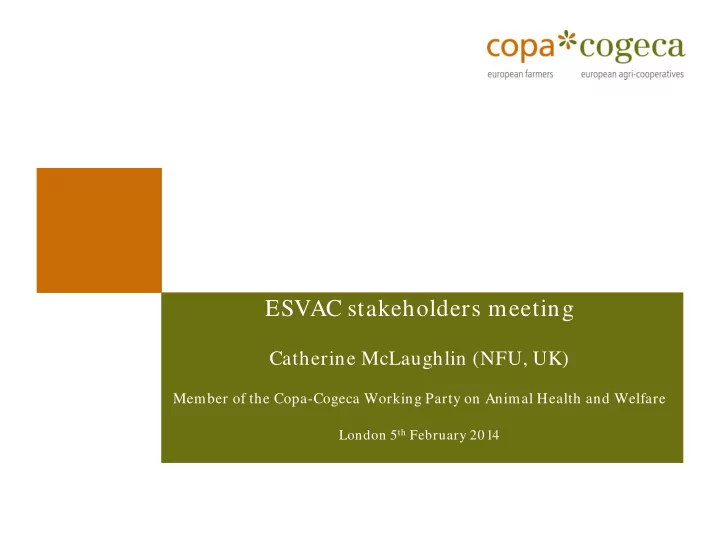

ESVAC stakeholders meeting Catherine McLaughlin (NFU, UK) Member of the Copa-Cogeca Working Party on Animal Health and Welfare London 5 th February 2014
Who are Copa and Cogeca? Copa – European farm ers Bringing together 57 EU farmers’ organisations Cogeca – European agri-cooperatives Bringing together 31 EU agricultural cooperative organisations Two organisations… • representing 11 million farmers and their families • as well as around 38,000 cooperatives • 70 Member and 34 Partner Organisations • 7 working languages: EN, FR, DE, IT, ES, PL, RO Copa-Cogeca | The voice of European farmers and their cooperatives | 2
Some facts to keep in mind
Livestock numbers, EU-27, 1995-2012 Compared to 1995, in 2012… • 15.1 million fewer pigs (- 9.4 %) • 25.3 million fewer sheep (- 22.8 %) • 16.1 million fewer cattle • 2.2 million fewer goats Source: Eurostat_Agriculture, forestry and fishery statistics 2013 Copa-Cogeca | The voice of European farmers and their cooperatives | 4
Production of meat, by type of animal, EU-27, 2005-12 Source: Eurostat_Agriculture, forestry and fishery statistics 2013 Copa-Cogeca | The voice of European farmers and their cooperatives | 5
Farm typology Specialist grazing livestock holdings (with dairy cows, cattle, sheep and other ruminants), Granivore holdings (pigs or poultry), Mixed livestock holdings Mixed crop-livestock holdings = alm ost half (46.7 %) of all Agri-holdings (12.2 m illion) in the EU-28 in 20 10 …with different distribution across countries Source: Eurostat_Agriculture, forestry and fishery statistics 2013 Copa-Cogeca | The voice of European farmers and their cooperatives | 6
Antimicrobials
Antim icrobial resistance is a serious concern 1. Responsible and transparent use of antim icrobials Good husbandry systems, biosecurity, feed hygiene, veterinary prescription Guarantee that bacterial infections in animals and humans can continue to be treated in future Prevent the transmission of resistant bacteria through the food-chain and into the environment 2. Im prove availability of new antim icrobials Access to smart, effective and also alternative tools to cure our animals, including new diagnostic tools Copa-Cogeca | The voice of European farmers and their cooperatives | 8
Transparency and responsibility of all key actors 1. A food chain approach is an important element of an effective strategy 2. Copa-Cogeca welcomes ESVAC’s aim to establish a system for collection of • reliable and • standardised data … on consumption of antimicrobial agents by animal species 1. A harm onised system of data collection is the basis for robust epidemiological surveillance programmes Copa-Cogeca | The voice of European farmers and their cooperatives | 9
Transparency – how to m ake it work at farm level ? 1. To be carried out in an aggregated m anner at the level of the veterinarian/ pharmacist, based on veterinary prescriptions 2. Farmers, however, still obliged to record all treatments to facilitate on farm post-treatment evaluation/ readjustments Im portant to guarantee Privacy and confidentiality of the information (e.g. effect on trade) – no benchmark of farms ! Quality of the data for robust comparative assessment Cost effectiveness of the exercise No further administrative burden at farm level Copa-Cogeca | The voice of European farmers and their cooperatives | 10
Transparency and responsibility of all key actors (II) 1. A possible pilot project focused on a limited number of countries and species is welcome 2. Addressing any possible differences in a coherent manner: Production systems across EU MSs Level of farms’ specialisation Distribution channels of antimicrobials Availability of antimicrobials/ diagnostic tools 3. Important to reflect on an outcome based system with clear responsibilities for Authorities/ Stakeholders Copa-Cogeca | The voice of European farmers and their cooperatives | 11
Conclusions 1. Building up on existing structures where possible 2. Consider the diversity of the farming system in Europe 3. Avoid further administrative burden at farm level 4. Ensure open dialogue with key players across all EU Member States for an effective and reliable monitoring system 5. Authorities still play an important role. Commitment has to be guaranteed 6. Ensure concrete facts, figures and scientific evidence in the ongoing debate on antimicrobial resistance Copa-Cogeca | The voice of European farmers and their cooperatives | 12
Recent publication Available on our website in IT, EN, DE, PL, ES, FR, RO,
Copa-Cogeca: Defending and developing the European Model of Agriculture www.copa-cogeca.eu Copa-Cogeca | The voice of European farmers and their cooperatives | 14
Recommend
More recommend